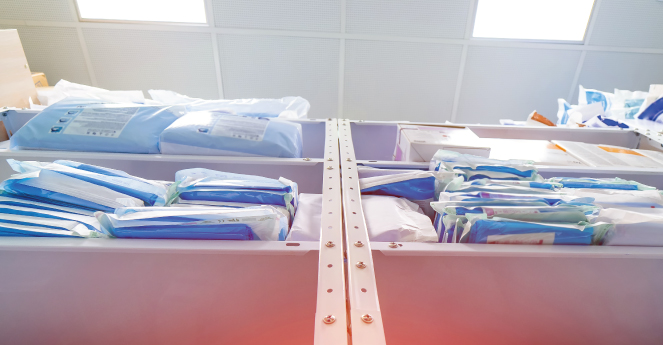The Unique Challenges of Inventory Management for Specialty Pharmacy
Specialty pharmacy faces many challenges when it comes to supply chain and inventory management. The aging population is already having a major impact on healthcare with larger numbers of people entering ages where medical conditions are prevalent. “That is driving a lot of focus on pharmaceuticals for disease treatment and condition management,” explained Keith Hoffman, VP of Sales and Marketing at Terso Solutions. According to an article in Pharmacy Times, new specialty medications for treating diseases like heart disease and cancer are expected to make up more than half of all revenue in the specialty pharmacy industry in 2025 (West & Filstein, 2022).
With the growth in new specialty drugs, pharmaceutical companies face a new set of challenges such as complex supply chains and increased regulatory oversight. “Many specialty drugs, especially biologics, require stringent temperature controls which necessitates a highly controlled and monitored cold chain,” said David Lefkowitz, VP of Market Development at Terso Solutions. Additional requirements for handling these drugs place a strain on the logistics systems involved.
With these emerging challenges for specialty pharmacy, it is clear that traditional inventory management systems need to evolve.
Where Traditional Inventory Management Systems Fall Short
Pharmaceutical professionals feel a growing number of pain points with traditional inventory management systems. “A lot of the pain is the lack of real traceability into the chain of custody for a drug,” explained Hoffman. Traditional inventory management systems often lack detailed tracking capabilities to capture information such as lot numbers, expiration dates, and information about the drug batch. “Specialty drugs may have shorter shelf lives, requiring careful inventory management to minimize waste and ensure availability,” Lefkowitz described.
The lack of security features in legacy systems is a second pain point. “Specialty drugs are often costly due to the complexity of their development and manufacturing,” Lefkowitz stated. “This high value necessitates enhanced security measures throughout the supply chain.” For example, according to consulting firm Mercer, new oncology specialty drugs are being introduced at higher price points with the annual cost of these products often exceeding $250,000 (Mercer, 2024). “If a drug is suddenly gone, did someone steal it? Did it get misplaced? Did it wind up at the wrong facility? All of that can happen,” Hoffman added.
Another pain point is traditional inventory management systems often still require manual steps, which leads to errors and limits the ability to forecast. “Even barcode systems still rely on people to intervene in some way,” Hoffman said. “These systems can work, but they are very labor-intensive and healthcare systems are already short-staffed.” The lack of adequate staffing increases the risk of manual errors in handling specialty pharmaceuticals. “Manual entry and reconciliation processes can lead to inaccuracies in inventory records, impacting stock levels and potentially leading to discrepancies,” Lefkowitz explained.
One final pain point is the lack of support legacy inventory management systems provide for meeting regulatory requirements for specialty pharmaceuticals. “Maintaining detailed records for compliance with regulations can be cumbersome and prone to errors with manual or outdated systems,” Lefkowitz stated.
All of these pain points indicate the need for more advanced inventory tracking solutions that adequately support the complexity of the growing specialty pharmacy industry.
The Crucial Role of IoT and Advanced Tracking Software in Specialty Pharmacy
While IoT (Internet of Things) and advanced tracking software that leverages RFID (radio frequency identification) are widely used in the retail and airline industries, their use in specialty pharmacy is starting to take off due to the challenges the industry faces. “IoT technology can automate the entire process so you don’t need to scan a box, open a door, and scan a bunch of barcodes,” Hoffman explained. IoT devices can provide real-time tracking of inventory, including location, temperature, and humidity. “Advanced tracking systems can send automated alerts for any deviations from predefined parameters which can help prevent spoilage and ensure compliance,” Lefkowitz described.
“Advanced software can use IoT data to optimize inventory levels by predicting demand more accurately and adjust inventory levels and production schedules dynamically in response to changing demand patterns,” said Lefkowitz. “This minimizes overstock and stockouts.”
Another feature of IoT and advanced inventory tracking technologies is enhanced security for high cost drugs. “These systems include things like GPS and cellular triangulation, and they give you data on where something is as well as where it is moving to and where it moved from,” Hoffman stated. “IoT systems can monitor and control access to sensitive areas where specialty drugs are stored, ensuring that only authorized personnel can access them,” Lefkowitz added.
Finally, IoT and advanced tracking software make it significantly easier to meet regulatory requirements. “Advanced tracking systems can provide easily accessible, real-time data and historical records, making it easier to prepare for inspections and audits,” Lefkowitz said. Having a clear audit trail is important for meeting regulatory requirements and patient safety. “Should there be any issue with these pharmaceuticals down the road, you know which patient received which drug, which batch the drug came from and the lot numbers,” Hoffman added.
Transforming Inventory Management for Specialty Pharmacy
To truly transform specialty pharmacy inventory management, organizations have to find the right technology partner to integrate leading solutions into their workflow. One such example is the collaboration between Cardinal Health Specialty Pharmaceutical Distribution – a leader in specialty drug distribution and services – and Terso Solutions – the leader in advanced inventory tracking systems. The partnership led to the creation of RFID-enabled consignment inventory capabilities for hospital and specialty pharmacies across North America (Cardinal Health, 2024). “By enabling a consignment program, the pharmacy is reducing costs since they do not have to purchase all the product outright from a manufacturer,” Hoffman said. “They are not charged until they actually use the drug with the patient.”
Terso Solutions’ technologies also enable many other benefits for clients like Cardinal Health such as automation that allows for simplified invoicing and billing. “With programs like the 340B Federal Drug Pricing program where you have medications that must be billed differently depending on the population being served, automation allows seamless management without needing multiple platforms and ensures proper compliance, especially with regulations like the Digital Supply Chain Act,” Hoffman described.
“Terso can help pharmaceutical companies maintain regulatory compliance more efficiently by providing real-time monitoring, accurate data collection, and advanced analytics,” Lefkowitz explained. In the specialty pharmacy space there are many regulatory requirements, but using technologies like IoT and advanced tracking software means meeting many of those requirements through automation. “Our system is compliant out of the box, which reduces stress for the end user regarding audits or FDA regulations,” Hoffman stated.
Preparing the Specialty Pharmacy Industry for the Future
There are a number of trends expected to impact the supply chain and inventory for specialty pharmacies in the next few years. Artificial Intelligence (AI) is one major area that is likely to have a significant role in everything from demand forecasting to inventory optimization. “AI could help with predictive analytics—analyzing real-time data to decide whether to move products between sites or adjust ordering,” Hoffman said. In addition, as IoT and advanced tracking technology evolve, the cost is likely to decline even while more features emerge. “Technology in general is getting smaller and more integrated,” Hoffman stated. “You could soon have sensors that combine humidity, temperature, RFID, GPS, and more into a single low-cost package.”
There are macro changes on the horizon for manufacturing more broadly which will benefit industries like specialty pharmacy. “Advances in manufacturing technologies, such as modular and scalable production systems, will allow for more flexibility in responding to changes in demand and supply chain disruptions,” Lefkowitz explained. “In addition, I expect to see the industry focus on building more resilient and agile supply chains to better handle disruptions, such as those caused by pandemics or geopolitical events.”
Terso Solutions is preparing to stay ahead of these changes. “We’re taking steps to stay ahead of emerging trends and continue to innovate in the specialty pharmacy space by adopting a proactive, forward-thinking approach,” Lefkowitz said. Some examples include exploring new technologies including AI, building strong partnerships with pharmaceutical companies, and focusing on customer-centric solutions. “We listen to our customers and what they’re seeing in the market,” Hoffman explained. “That feedback drives a lot of our technological investments.”
Finding the right technology partner is key for pharmaceutical leaders who want to be future-ready. Attributes to look for include industry knowledge, track record of successful implementation, and the ability to adapt to changing business needs. “You want a partner who understands healthcare and pharmaceuticals and is interested in building a lasting relationship,” Hoffman stated. “A partner that understands your strategic objectives and can support them with innovative solutions will be a valuable asset,” Lefkowitz concluded.
References:
- West, S. Filstein, D. (2022, January 20). Outlook for health system-based specialty pharmacy in 2022 and beyond. Pharmacy Times. https://www.pharmacytimes.com/view/outlook-for-health-system-based-specialty-pharmacy-in-2022-and-beyond
- Mercer Government. (2024, March 25). 2024 drug trend and pipeline report. https://www.mercer-government.mercer.com/our-insights/2024_DrugTrendAndPipeline.html
- Cardinal Health. (2024). Technology innovations enabling advanced consignment inventory models for specialty drugs https://www.tersosolutions.com/wp-content/uploads/2024/06/cardinal-health-consignment-Terso-Solutions.pdf

Lisa Brooks, RN, MSN, MBA
Informatics Nurse, Health Writer
Lisa Brooks is a Registered Nurse with masters’ degrees in Nursing Informatics and Business Administration. She spent 6 years of her career in bedside clinical care before moving into health technology. Over the last decade, Lisa has done everything from teach computer system classes for nurses, to lead large technology projects at healthcare companies. She is a thought leader, writer, and the voice behind Writing the Future of Health – a site that brings nursing and technology together.








